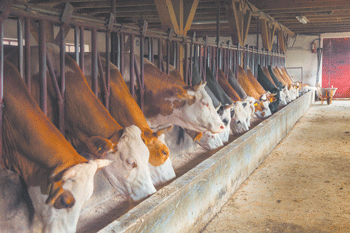 Food plays a major role in our lives, especially during what we call “the holidays.”
Food plays a major role in our lives, especially during what we call “the holidays.”
We kick off the season with Thanksgiving turkey and all the “fixins,” whatever that means, at individual celebrations. Right now, we are in what I think of as the goodie phase of the holidays. Neighbors share divine treats — toffee, salted nuts, homemade holiday cookies with icing, even fruitcakes, and we love them all. Many of us have big Christmas dinners, maybe not the proverbial English goose and “figgie” pudding, but our own versions of feasting nonetheless. We top off the season with New Year’s bubbly and greens and black-eyed peas for good luck.
We also have huge problems with the systems that produce our food. Food production in the United States and in other parts of the world has become so industrialized that is endangering us and our environment. Food production of both crops and livestock is so mechanized that it bears little resemblance to the crops our forebears grew or the animals they tended.
What does industrial food production actually mean?
Since the mid-20th century, crops of all sorts have been increasingly grown with the use of machinery, irrigation and especially the widespread use of chemical pesticides and fertilizers. This growth takes place on huge fields of hundreds, sometimes thousands, of acres and often lacks crop diversity or crop rotation. This system is efficient and has been profitable for the large corporations which use it, but at a high cost to our environment. Agriculture accounts for as much as 90% of fresh water use in some parts of the nation, and farming the same crops in the same way year after year depletes the soil. In addition, it leaves behind chemicals and elements and, in truth, no one really knows the long-term impacts on our earth or on us. There are lakes and other bodies of water in our nation where swimming and other recreational activities are no longer allowed, dead zones where no plant or animal life exists because of agricultural chemicals.
Ditto for livestock — cattle, poultry, seafood — production, which is so industrialized that some animals’ feet never touch the earth. They go from “house” to “house” as they grow in size until the day they meet their maker and their body parts begin journeys to our neighborhood supermarkets, a practice known as confined animal feeding operations, or CAFO. These packed-in animals grow up on antibiotics, hormones and vitamins, whose effects on us or our environment are not always clear. Eastern North Carolina, including Cumberland and surrounding counties, have ongoing experience with this sort of livestock production and its consequences. No matter what we call them, “lagoons” of animal waste dotting the North Carolina landscape cannot be a state asset.
Industrial food production is efficient but unsustainable, with preserved food traveling sometimes cross-country and internationally before human beings consume it. We cannot continue this way without severe and long-lasting environmental damage and negative effects on the human beings in proximity to such operations. We do not really know the effects on those who consume these products, both plant and animal. Quantity may not be more important than quality.
To be sure, there is growing concern about industrialized food production, and increasing numbers of Americans are turning to more sustainably produced food, grown in more traditional and more humane conditions. Such food, however, is unavailable in some communities and when it is available, it is likely to be more expensive than industrially produced food.
Among the many challenges facing our nation and the world in coming decades is developing more sustainable and more humane food production and making it both available and affordable. Earl Butz, America’s Secretary of Agriculture in the 1970s, famously said to farmers “get big or get out,” and that has largely happened. It is time now to pay attention to a quote attributed to various 19th century Europeans, “we are what we eat.”
All I can say is that this American is trying to eat cleaner and closer to home this holiday season, goodies and all.

 How to resolve AdBlock issue?
How to resolve AdBlock issue? 








